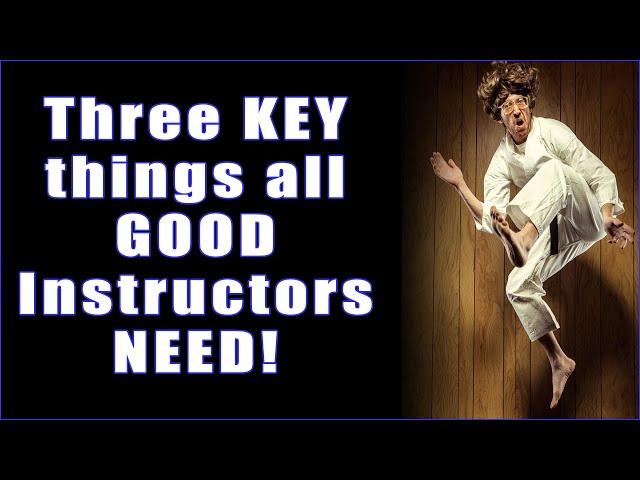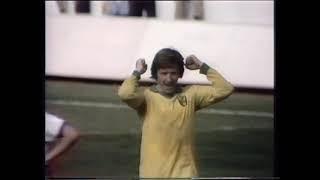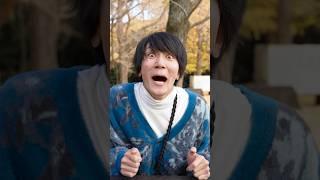
Three KEY things all GOOD Instructors NEED!
Комментарии:

Studying game design in college, we had to rethink our definition of fun. One particular facet my professor brought to light was how many gamers get absolutely furious at games they keep losing, but keep playing. We were challenged dissect the experience to understand why people like that keep coming back for more aggravation.
The conclusions we came to involved our optimism about what will happen when we complete difficult tasks, how we get bored with the too easy, how it forces us to reevaluate our approach to said challenge, and the greater sense of achievement from succeeding where many give up. The list goes on, but a lot of game design theory can explain why people train as hard as they do.
Raph Kosters "A Theory of Fun" did a lot to reinvigorate my passion for martial arts.

My top 2 is Patience and Empathy 🙏🏼
Ответить
I had an Instructor, because I was scatter brain in my youth say; if you practice 5 minutes a day at home. You’ll get it. Four years later, I was a First Don.
Because of your stand up Comedy, is why I enjoy watching you videos. That and it gives other ideas on how to be better. So Thank you.

Damn, Iain, epic wisdom as always! Thank you sir.
Ответить
Ian, what are the best books your recomend (IN ENGLISH) from the old masters. Anko Itosu, Motobu Choki & GIchin Funakoshi for understanding thier original applications ?
Ответить
One of the things that people liked about when I taught was that, I never gave up if they weren't getting it. I would keep explaining what I was teaching as many different ways as possible until it clicked for them.
Ответить
Not pressed play yet but I'll be upset one of them isn't a cauliflower ear and another isn't toes that look like a T-Rex's hands.
Ответить
Excellent it was like you were taking the words out of my mouth especially on the third major factor on being a good instructor I practice tangsoo do and was part of the IMA S NARS Tangsoo do for 15 years I got to 3rd dan and wasn't allowed to grade anymore because I wouldn't conform to their way I had my own classes and at gradings my students would be bullied by master belts and when I complained I was given ultimatums and wasn't allowed to challenge there attitudes towards other instructors students because I was being disrespectfully to there rank and then I found out my students were paying more for gradings because I wasn't master belt and I was paying a surchard on the rent of my hall to my instructor it was a pyramid affect it was all about money and they were gradings were every 3 months and they were just giving black belt and master belts away very Sub standard no one was allowed to have an opinion I had to leave the best thing I ever Done
Ответить
thanks Iain !!
Ответить
First of all, thank you Sensei Iain, these are very great points to take to heart.
Second, maybe someone here has a tip for me... On the last point. I lead a university sport's class. Means, I have students from various backgrounds for 90mins/week. One of them seems to come from a rather "low level" Dojo... Really bad technique. Also has troubles with coordination. But although me and the beginner's class instructor both advised him to join the beginner's class as well, to review the basics, he refused to do so and doesn't really see his techniques as being bad. He also doesn't really put his heart into training, but says he's eager. And he does show up to every lesson. How can I teach this guy to be better? How can I open his eyes? He wants to test for 5th Kyu in December... In my humble opinion he isn't even fit for 7th Kyu... What do I do? Let him fall on his nose when he takes the test? I don't want that though... 🙈

this speaks to me. got a kid in my class who's all arms & legs and can't quite handle himself in sparring, but once there's a pre-set structure like kata, he shines. big contrast from the other kids who really just wanna have a go at each other and get bored very quickly with kihon & kata.
Ответить
You're totally right about the entertaining part, it has to be fun for you and the students! I had to quit as an instructor when I stopped enjoying it. It can't be much fun for the people in the row either. Maybe it qualifies as a burnout when you start to force yourself into the gym and stop training yourself. Then the covid came and I never went back.
Ответить
Always excellent videos. Many thanks Iain!!
Ответить
Is that Simon Helberg in the vidcap?
Ответить
I no longer teach or train karate, I now teach Juggling and Circus but these points are still very relevant and I still see these different archetypes all over the place. Enjoyed this video a lot
Side note, I don't know how you feel about 'react' content but it would be very interesting to see you react or review the USDC seasons 1+2 from Rokas over at Martial Arts Journey

Having a household of neuro divergent people has helped me immensely in my teaching skills. I have learned many techniques and approaches to assist students who are struggling. Sometimes, it takes several goes to get an idea across. My little dojo is a mixed bag of ages, genders, and the neuro spicy(this includes me).
Ответить
Yeah a lot of people don't understand there is a difference between teaching at your dojo, versus a seminar. Just the finer details students understand immediately is or can be an entire training theme.
Ответить
Great video pal, made me laugh so much because I could think of so many of the instructors you categorised 😂
Ответить
Hi sensei.. (my instructor gets humpy me calling him that Too!)
I currently train in kyokushinkai, which is lucky as I spent a lot of time in goju and shotakant 😅
My main style is Kudo, if I teach it's my version of street Kudo usually.
Personally I like teaching, it challenges me non stop! It's the business side mate, and doing a video on that would be talk of the town on mcdojo Web pages 😅
Iann, I'm confident in my self and what I have to teach. I'm a much better Blake belt at wiring in fuse boards though 😅👍

"It's not always about the instructor, but sometimes about the student." Yes, fully agree with that. When somebody asks me, how long it takes to reach black belt, I tell them, that I cannot tell. As it depends on multiple factors: 1) how good is the teacher at understanding the students desires, 2) how good can the teacher adapt his teaching to meet the students desires, 3) how well do teacher and student get along, i.e. how good is the student at understanding the teachingmethods of the teacher, 4) how regularly does the student appear at the Dojo to practise, i.e. how invested is the student. All these factors determine, how long it will take a student to get there. And any instructor who gives an answer like "It takes x years" or "x years and you got it" is simply not a serious martial arts practitioner / teacher.
I started teaching on a regular basis back in 2012, after my sensei passed away. And inexperienced as I was (passed my Shodan test just 1 year prior), I made a lot of mistakes. I would even go so far to say that some students left because of my inexperienced teaching style. But I learned from my mistakes and I keep learning, trying to expand my horizon. In the Dojo where I teach, we are 4 black belts: 3 with Nidan (I am one of them) and one with Shodan. Each of us is hungry to expand their horizon, but the question is, if it is really necessary to go for Dan test after Dan test? I think this question is best answered if evreybody answers it for himself.

I treat my club as my 2nd family, I have another 3 dan grades who instruct with me and we are great friends and we ensure all who come through the door leave with a smile on there face. At the end of the day, for most people, it's a hobby, and hobbies are meant to be enjoyed and engaging enough to be able to achieve the goal they set out for
Ответить

























